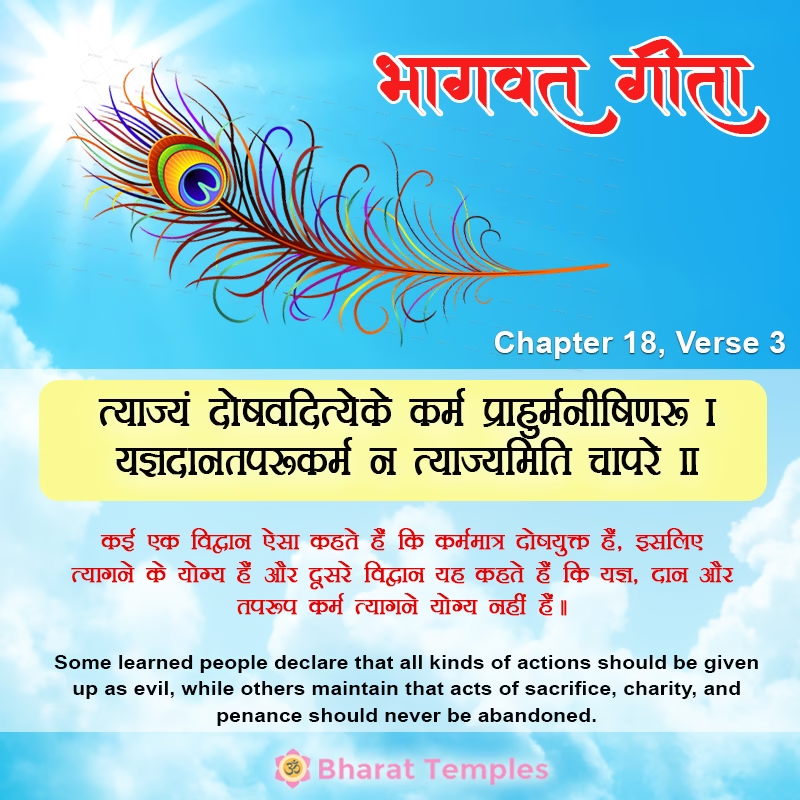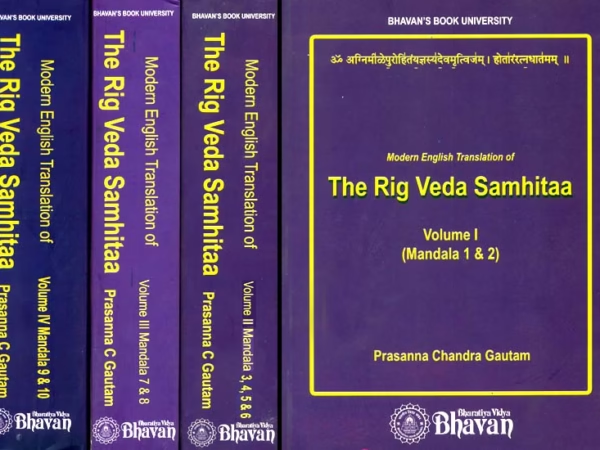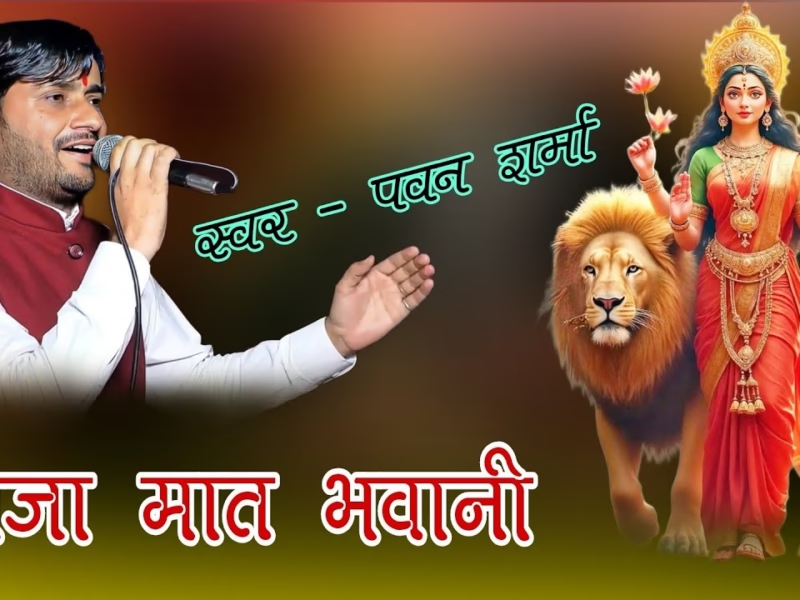Contents
त्याज्यं दोषवदित्येके कर्म प्राहुर्मनीषिण: |
यज्ञदानतप:कर्म न त्याज्यमिति चापरे ||
tyājyaṁ doṣha-vad ity eke karma prāhur manīṣhiṇaḥ
yajña-dāna-tapaḥ-karma na tyājyam iti chāpare
भावार्थ:
कई एक विद्वान ऐसा कहते हैं कि कर्ममात्र दोषयुक्त हैं, इसलिए त्यागने के योग्य हैं और दूसरे विद्वान यह कहते हैं कि यज्ञ, दान और तपरूप कर्म त्यागने योग्य नहीं हैं॥3॥
Translation
Some learned people declare that all kinds of actions should be given up as evil, while others maintain that acts of sacrifice, charity, and penance should never be abandoned.
English Translation Of Sri Shankaracharya’s Sanskrit Commentary By Swami Gambirananda
18.3 Eke, some; manisinah, learned ones, subscribing to the views of the Sankhyas and others; prahuh, say; that dosavat, beset with evil (as it is);-What is it?- karma, action, all actions, becuase they are the cause of bondage; tyajyam, should be given up even by those who are eligible for actions (rites and duties). Or, it (action) is to be given up dosavat, just as defects such as attachment etc. are renounced. Ca and, in that very context; apare, others; (say) that yajana-dana-tapah-karma, the practice of sacrifice, charity and auterity; na tyajyam, should not be given up.
These alternatives are with regard to only those who are alified for action, but not with regard to the monks who are steadfast in Knowledge and have gone beyond the stages of life. This discussion is not concerned with those who are held to be outside the scope of eligibility for action in the assertion (by the Lord), ‘The steadfastness in the Yoga of Knowledge by men of realization was spoken of by Me in the days of yore’ (see 3.3).
Objection: Well, just as those who are alified for rites and duties and who have their distinct steadfastness are being considered here in the chapter summarizing the entire scripture, though they have been dealt with earlier in ‘৷৷.through the Yoga of Action for the yogis’ (3.3), similarly, let even the men of realization who are steadfast in Knowledge be considered here.
Reply: No, because it is not logical that their renunciation should result from delusion and sorrow (cf. 7 and 8). The men of realization do not perceive in the Self the sorrows arising from physical torment; for it has been shown that desire etc. are attributes only of the field (body) (see 13.6). Therefore, they do not renounce action but of fear for physical trouble and pain. Nor do they perceive actions in the Self, on account of which they should give up obligatory duties out of delusion. In fact, they renounce with the conviction that ‘action belongs to the organs’ (see 3.28); ‘I certainly do not do anything’ (see 5.8); for, the mode of renunciation of an enlightened person was shown in, ‘৷৷.having given up all actions mentally’ (5.13). Therefore, those others who are alified for rites and duties, who are unelightened about the Self, and for whom renunciation is possible out of delusion and from fear of physical trouble, are alone condemned as persons who, being possessed of tamas and rajas, resort to renunciation. And this is done with a veiw to eulogizing the renunciation of the results of rites and duties by the unenlightened men of action.
Besides, the men of renunciation in the real sense have been particularly pointed out in, ‘who has renounced ever undertaking,’ ‘who is silent, content with anything, homeless, steadyminded’ (12.16, 19), and also (while determining) the characteristics of one who has transcended the gunas (Chapter 14). The Lord will further say, ‘৷৷.which is the supreme consummation of Knowledge’ (50). Therefore the monks steadfast in Knowledge are not intended to be spoken of here. It is only the abandoning of the results of action which, by virtue of its being imbued with the ality of sattva, is spoken of as sannyasa in contrast to the renunciation of actions which is possessed of tamas etc.; it is not sannyasa in the primary-sense-the renunciation of all actions.
Objection: According to the reason shown in the text, ‘Since it is not possible for one who holds on to a body to give up actions entirely’ (11), may it not be argued that the actions entirely’ (11), may it not be argued that the word sannyasa is certainly used in the primary sense because it is impossible to abandon all works?
Reply: No, for the next adducing the reason is meant for eulogy. Just as, ‘From renunciation immediately (follows) Peace’ (12.12), is a mere eulogy of renunciation of the fruits of action, it having been enjoined on Arjuna who was unenlightened and incapable of undertaking the various alternatives (paths) as stated earlier, so also is this sentence, ‘Since it is not possible for one who holds on to a body to give up actions entirely’ (11), meant for eulogizing the renunciation of the resorts of all actions. No one can point an exception to the proposition that ‘having given up all actions mentally, (the embodied man of self-control) continues happily৷৷.without doing or causing (others) to do anything at all’ (see 5.13). Therefore these alternative veiws regarding sannyasa and tyaga are concerned only with those who are alified for rites and duties. But the enlightened ones who have realized the supreme Truth are competent only for steadfastness in Knowledge, which is characterized by renunciation of all actions; not for anything else. Hence, they do not come within the purview of the alternative veiws. Thus has this been pointed out by us in connection with the text, ‘৷৷.he who knows this One as indestructible৷৷.’ (2.21) as also in the beginning of the third chapter.











